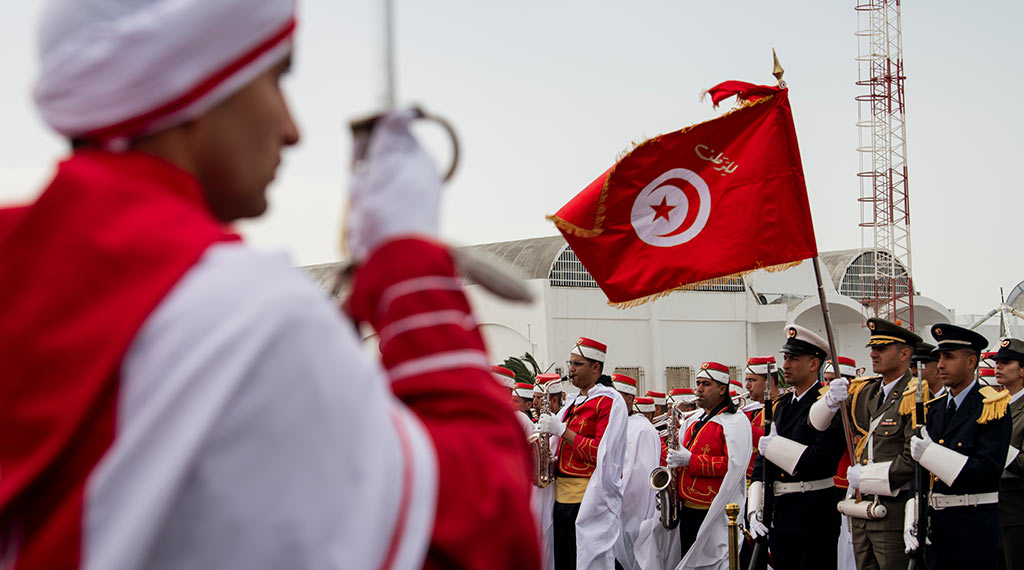Tunisian revolt against Islamists marks the beginning of their end in the country

Tunisian President Kais Saied’s appointment of a new head for Tunisian National Security and a commander for the National Guard reflects his willingness to tighten his grip on a dwindling security situation in the country.
A mix of dire economic conditions, collapse of the health system against the Covid-19 pandemic, and corruption from Islamist figures led thousands of Tunisians to take to the streets on July 25th demanding the ousting of the Islamist dominated parliament. Violent protests in Tunisia targeted the Muslim Brotherhood-affiliated Ennahda party. Protestors stormed and torched Ennahda’s headquarters and several offices around the country.
Under pressure from street protests, President Saied took some decisive measures, suspending the Parliament and ousting the Islamist-backed government led by former Prime Minister Hichem Mechichi. The decisions were met by mass celebrations by Tunisians across the country but clashes were instigated by Islamist supporters around the Tunisian parliament and in several cities.
President Saied stated that conspiracies are being woven against Tunisia and said he had taken action to protect the nation from falling into chaos. Tunisian security foiled an assassination attempt on Said during a local trip which was announced August 22nd. From his side, Ennahada’s founder and Speaker of the Parliament Rachid Ghannouchi accused Saied of orchestrating a coup ‘d’état against the Tunisian revolution and the Parliament. He called upon the army and security to reject the president’s decisions.
Tunisia, once labelled the success story of the Arab Spring Revolutions was left in chaos after a decade of Islamist rule led by the Ennahda Movement. The conditions leading to the revolution were created by Ennahda efforts to infiltrate and control every aspect of the country. Ghannouchi managed to survive votes of confidence in the Tunisian parliament but faces internal disputes with members of his movement who blame him for failure. As a result of the current crisis, a wave of resignations struck Ennahda as a large number of its members and leaders left the party because of their conflict with Ghannouchi.
Moreover, the former government of former Prime Minister Hichem Mechichi failed to attain security and economic growth as the country heads towards bankruptcy. The Tunisian GDP growth contracted by 8.8 percent in 2020 while unemployment increased to alarming rates 15% prior to the Covid-19 pandemic to 17.8 percent by April 2021.
The Islamist-controlled Tunisian parliament became a source of ridicule and anger as female members of parliament were not spared verbal and physical assaults by Islamist MPs such as former presidential nominee Abir Moussi who was slapped on the face and attacked by two Islamist MPs inside the halls of the Parliament.
Tunisian prosecutors opened investigations of alleged foreign funding into three political parties including the Ennahda party. The investigation followed Said’s accusations of corruption against a number of Tunisian Parliament MPs, many of whom were members of the Ennahda movement. As Tunisian MPs have been stripped from their immunity in accordance of Saied decrees, MP Lotfi Ali was arrested on charges of corruption by Tunisian authorities on August 21. Ali is among 3 whom Tunisian courts issue a warrant for their arrest while 11 others have been ordered not leave the country.
During its control of the Tunisian parliament, the Ennahda party created cover-ups for assassinations and blocked investigations covering the existence of their secret security-apparatus linked to the assassination of politicians Mohamed Brahmi and Chokri Belaid who were killed in separate 2013 shootings.
President Saied accused Ennahda of financing looters to ignite civic violence and warned those who will use violence or bullets will be met with the same. “Certainly, if the coup continues and the security forces begin to practice dictatorial practices, we will exert all our forces to avoid that” said Ghannouchi, implicitly threatening violence during an interview with Italian newspaper Corriere Della Sera on July 31st.
Ghannouchi has been a source of menace for the Tunisian president and was conducting his own form of foreign policy for Tunisia, acting like the de-facto president of the country. Ghannouchi secretly travelled to Turkey to meet with Islamist President Recep Tayyib Erdogan. Turkey is still Ennahda’s most powerful ally outside the country. Ghannouchi attempted to place Tunisia under the Turkish sphere by aligning the country’s policy towards Turkey and supporting its presence in Libya.
Tunisia is unlikely to be spared from the Muslim Brotherhood retribution. News reports indicate that units following the Muslim Brotherhood are nearing the Libyan–Tunisian border, which is a major threat to the country’s security and would represent the opening of a new front. As a result Tunisian army raised the alert to thwart the Muslim Brotherhood plans. One ISIS leader Abu Zaid al-Tounsi was arrested attempting to cross the Libyan border into Tunisia.
The infiltration of militia units from Libya into Tunisia would follow a similar pattern to what followed the successful June 30th 2013 revolution in Egypt. The Egyptian army destroyed over 10,000 SUVs belonging to terrorists attempting to cross the border from Libya from 2013 to 2020, according to Egyptian Presidential spokesman Bassam Rady in July 2020.
Even with Islamists feeling rejoiced at the sight of US forces withdrawing from Afghanistan and Taliban declaring victory, Islamists in the Middle East and North Africa are losing ground as their rule characterized by radicalism, misogynism and financial corruption proved too much for the Middle Eastern population that hope for better life post the Arab Spring revolutions but instead they suffered much worse under Islamist rule. A decade of Islamist rule in Tunisia has left the country economically battered and the Islamists’ reputation significantly tarnished.
Tunisia International Aerospace and Defense Exhibition 2020 by US Africa Command is licensed under CC BY 2.0
- Egyptians shocked by US decision to delist Gama’a Islamiyya - June 2, 2022
- Turkey is still dispatching mercenaries into Libya - November 30, 2021
- Erodgan’s shady role in Afghanistan - November 9, 2021
